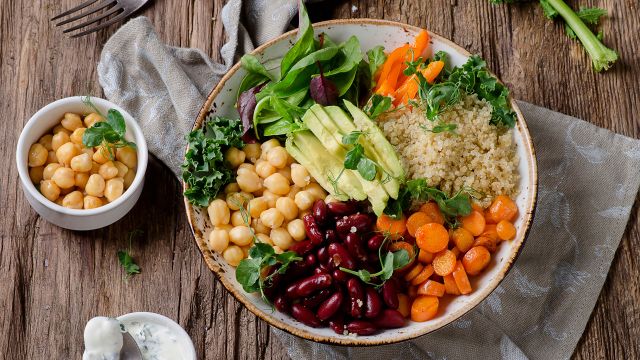If you’ve read anything about healthy eating plans for people with diabetes, you’ve probably seen the term “plant-based diet.” But what does it mean?
It’s simple: The lion’s share of your plate features vegetables, legumes, beans, fruit and whole grains.
Here’s what you need to know about a variety of plant-based diet options and how they might work for you as part of your overall diabetes care plan.
You’ve got options
If you’re curious about following a plant-based diet, there are several types to choose from, all of which can help your health:
- Vegan diets eliminate animal products completely. This diet is 100 percent plant-based.
- Ovo-lacto vegetarians eat eggs and dairy products, but no meat, fish or poultry.
- Pescatarians give up meat and poultry but still eat fish.
- Semi-vegetarians still eat animal products, but only in small amounts. Both the Mediterranean diet and the DASH (Dietary Approaches to Stop Hypertension) diet qualify as semi-vegetarian and both are recommended by the American Diabetes Association.
Plant-based diets offer benefits
Switching to a balanced, plant-based diet will change the mix of nutrients you’ll eat every day. This may be particularly helpful for those with diabetes or other chronic health conditions.
- Numerous studies have shown that vegetarian, and especially vegan, eating plans—which are naturally high in fiber—lower blood sugars and decrease the need for required medications for people with type 2 diabetes. Some research has found that these diets are even more effective for controlling blood glucose than carbohydrate counting, a traditional approach for people taking insulin.
- You’ll be eating fewer animal products. These products are a major source of saturated fat, which increases your risk of cardiovascular disease. Reducing or eliminating them is associated with lower blood pressure and cholesterol levels.
- People who follow vegetarian diets tend to eat fewer overall calories than meat-eaters do. In several studies that compared vegetarian or vegan diets to conventional diabetic diets, participants on the plant-based plans lost more weight.
Potential downsides are worth keeping in mind
Plant-based diets are not without drawbacks, however. For example, they can increase your risk of deficiency for a few important nutrients.
- Vitamin B12 is found mostly in animal products, so deficiency among vegetarians and vegans is common. If your doctor has prescribed you metformin, you’re already at risk of a B12 deficiency. This can increase your odds of developing diabetes complications like nerve pain, retinopathy (diabetic eye disease) and cardiovascular disease, so talk to your medical team about monitoring your levels.
- Omega-3 fatty acid intake tends to be lower in vegetarians and vegans than in people who eat more animal products. But omega-3 fatty acids offer several protections to people with diabetes in particular. They lower risk of cardiovascular disease and retinopathy and improve kidney function. Your doctor may recommend that you take a vegetarian-friendly, algae-based omega-3 supplement to make up for your reduced intake.
- Iron, vitamin D and calcium deficiencies are also common among vegetarians and vegans. Again, talk to your doctor or dietitian about whether you need to take supplements.
All in all, though, the evidence suggests that a plant-based diet can help your health.
Hawaii’s resources
Interested in exploring your own plant-based diet? Thankfully Hawaii has plenty of fresh fruits and vegetables available. Try shopping at Blue Zones Project Approved™ grocery stores like Foodland Farms, KTA Super Stores, Down to Earth, Sack N Save or Whole Foods Market.
You can also skip the store and check out a farmer’s market in your area. Farmer’s markets are a great way to learn about local agriculture and get fresh-picked produce. Thanks to the tropical environment and rich soil, Hawaii is perfect for growing a wide variety of foods such as mangos, papaya, pineapple, apple bananas, avocados, eggplant, bok choy, Okinawan sweet potatoes and more. Because of the boom in plant-based diets and variety of produce available, several restaurants around the islands have begun to specialize in vegan and vegetarian fare. It’s easier than ever to get a nutritious diet.





